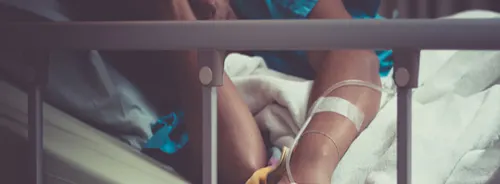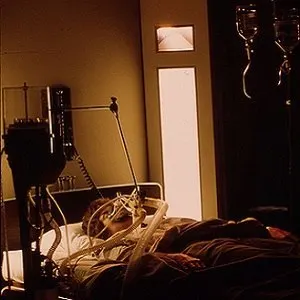A systematic review finds no clear evidence on the effectiveness of different non-pharmacological interventions — including noise reduction, music therapy and social support — for improving sleep in critically ill adults in the ICU. The results are discussed in an article published in the Cochrane Database of Systematic Reviews (CDSR).
Sleep is essential to enable adults in the ICU to recover from their illnesses. However, adult patients often suffer from a lack of sleep or frequent sleep disruptions, which may be due to a number of reasons: the underlying illness, uncomfortable therapy, psychological stress, or the ICU environment itself. Non-pharmacological interventions, such as noise reduction, music therapy, alternative and complementary therapies have been recommended for improving the duration and quality of sleep in the ICU.
This review of all relevant data aimed to assess whether non-drug interventions are safe and clinically effective in improving sleep quality in critically ill adults. Rong-Fang Hu, RN, PhD, of the School of Nursing, Fujian Medical University, Fujian, China, and co-authors searched online databases (including CENTRAL, EMBASE, MEDLINE, CINAHL) and trials repositories/registries to June 2014. They also handsearched critical care journals and reference lists and contacted relevant experts to identify relevant unpublished data. The search included all randomised controlled trials (RCTs) and quasi-RCTs that evaluated the effects of non-pharmacological interventions for sleep promotion in critically ill adults (aged 18 years and older) in the ICU.
Thirty trials, with a total of 1,569 participants, were included in this review. Non-drug interventions included earplugs and eye masks, changes to ventilator type and settings, relaxation therapy, sleep-inducing music, massage, foot baths, aromatherapy, valerian acupressure, sound masking, and changing the visiting times of family members.
Overall, the quality of the evidence for an effect of the interventions on any of the outcomes was "low or very low," according to the researchers. The review team tried to pool findings from similar trials of each intervention, but this was difficult because the design of the trials varied greatly. They were able to combine the results from three trials of earplugs and eye masks and found that their use increased the number of hours slept and prevented delirium in adults in the ICU. "However, we cannot be certain about these findings because of problems with how the trials were carried out," the team notes.
The effects of the interventions on objective sleep outcomes (eg, sleep measured by a machine) varied: the majority of studies that looked at the use of earplugs and eye masks found no benefit, and although the results from six trials of ventilator modes suggested that certain ventilator settings might offer benefits over others, the results of the individual trials did not always agree with each other. The trials did not clearly report adverse effects, although there was very low quality evidence that ventilator mode might influence certain adverse effects that can happen when people are on a ventilator.
"In summary, further well-designed and conducted research is needed to strengthen the evidence for the use of these interventions for improving sleep in critically ill adults," the authors conclude.
Source: Wiley Online Library
Image credit: Flickr.com
Sleep is essential to enable adults in the ICU to recover from their illnesses. However, adult patients often suffer from a lack of sleep or frequent sleep disruptions, which may be due to a number of reasons: the underlying illness, uncomfortable therapy, psychological stress, or the ICU environment itself. Non-pharmacological interventions, such as noise reduction, music therapy, alternative and complementary therapies have been recommended for improving the duration and quality of sleep in the ICU.
This review of all relevant data aimed to assess whether non-drug interventions are safe and clinically effective in improving sleep quality in critically ill adults. Rong-Fang Hu, RN, PhD, of the School of Nursing, Fujian Medical University, Fujian, China, and co-authors searched online databases (including CENTRAL, EMBASE, MEDLINE, CINAHL) and trials repositories/registries to June 2014. They also handsearched critical care journals and reference lists and contacted relevant experts to identify relevant unpublished data. The search included all randomised controlled trials (RCTs) and quasi-RCTs that evaluated the effects of non-pharmacological interventions for sleep promotion in critically ill adults (aged 18 years and older) in the ICU.
Thirty trials, with a total of 1,569 participants, were included in this review. Non-drug interventions included earplugs and eye masks, changes to ventilator type and settings, relaxation therapy, sleep-inducing music, massage, foot baths, aromatherapy, valerian acupressure, sound masking, and changing the visiting times of family members.
Overall, the quality of the evidence for an effect of the interventions on any of the outcomes was "low or very low," according to the researchers. The review team tried to pool findings from similar trials of each intervention, but this was difficult because the design of the trials varied greatly. They were able to combine the results from three trials of earplugs and eye masks and found that their use increased the number of hours slept and prevented delirium in adults in the ICU. "However, we cannot be certain about these findings because of problems with how the trials were carried out," the team notes.
The effects of the interventions on objective sleep outcomes (eg, sleep measured by a machine) varied: the majority of studies that looked at the use of earplugs and eye masks found no benefit, and although the results from six trials of ventilator modes suggested that certain ventilator settings might offer benefits over others, the results of the individual trials did not always agree with each other. The trials did not clearly report adverse effects, although there was very low quality evidence that ventilator mode might influence certain adverse effects that can happen when people are on a ventilator.
"In summary, further well-designed and conducted research is needed to strengthen the evidence for the use of these interventions for improving sleep in critically ill adults," the authors conclude.
Source: Wiley Online Library
Image credit: Flickr.com
References:
Hu RF et al. (2015) Non-pharmacological interventions for sleep promotion in the intensive care unit. Cochrane Database of Systematic
Reviews 2015, Issue 10. Art. No.: CD008808. Published online 6 Oct 2015.
DOI: 10.1002/14651858.C
Latest Articles
healthmanagement, sleep, critically ill, ICU, ventilator, music, non-drug interventions
A systematic review finds no clear evidence on the effectiveness of different non-pharmacological interventions — including noise reduction, music therapy and social support — for improving sleep in critically ill adults in the ICU.










